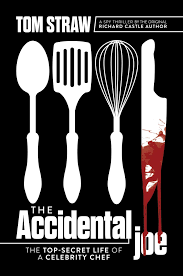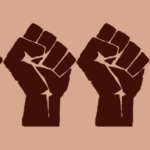At Night Court one Christmas, John Larroquette gave me a sofa pillow embroidered with: “Dying is easy. Comedy is hard.” Larroquette, who makes the work of acting comedy and drama look effortless, gave it to me knowing it also crystalized the struggle of a writer.
The real battle isn’t writing comedy or drama. It’s mixing the two. In crime and thriller novels, it’s murder.
But not impossible. There’s simply a high degree of difficulty. Yet, when it works, it’s freaking magical. I’m talking about you, Mick Herron. Your Slow Horses series crackles with mystery and tension. But what elevates it is the humor. Reviewers call it dark comedy. I call it human comedy because it comes out of characters responding like real people to real situations. Sometimes with fright, horror, violence, or tears. Other times, with a wisecrack or an insult. Or, when one of them is Jackson Lamb, the world-weary den father of MI5’s dumpster, with a loud, prolonged, public passing of gas. Reading Herron, you let out shock laughter in the backwash of tragedy. His novels are a must-study for a tone balance that’s pitch perfect. Why?
I worked on Nurse Jackie, a dark comedy TV series. That meant we wore the twin masks of drama and comedy. Like I said, a high degree of difficulty. So, beginning each year, I made a speech to the writers’ room that, to pull off this feat, comedy and drama need to be good roommates.
It’s that simple and that complex.
Let’s stick with books. Let’s celebrate the alchemists—authors who forged tense mysteries and thrillers where humor also thrives. Like Janet Evanovich, right from the gate, in 1 for the Money. Elmore Leonard, who mined humor with hapless strivers in Swag, Get Shorty, and more. Then there’s Carl Hiaasen and the recently departed Tim Dorsey, both making Florida seem like a fun place to take a beating. Rachel Howzell Hall brings the funny amid tragedy through her LA homicide detective, Elouise Norton. Can’t leave off Robert Crais, Joe R. Lansdale, or Gregory McDonald. And then there’s the master, Donald E. Westlake, who consistently staged a Cirque du Soleil balancing act in The Ax, The Hook, and his intimidatingly sublime Dortmunder series.
These top-flight authors took me to school. I’ve not only studied how they crafted a story, I’ve marveled at the ways they threaded the needle between laughter and slaughter. They helped me find my hybrid voice in my first novel, The Trigger Episode, and all seven of my Nikki Heat series, writing as Richard Castle. I’m still learning from them.
What have I learned?
If you’re looking for rules, I’m not your guy. In his essay, “Ten Rules of Writing,” Elmore Leonard’s first rule was never open a book with weather. My first Nikki Heat novel was entitled Heat Wave, and guess what I opened with? Yup. Elmore Leonard, you were a god to me but, sorry, Dutch, that book went to number six on the New York Times list. Then there’s “Mario Puzo’s Godfatherly Rules for Writing a Bestselling Novel.” First rule: “Never write in the first person.” Huh. My latest spy thriller, The Accidental Joe, had difficulty getting traction at first, a euphemism for WTF?! At the risk of finding a horse’s head in my bed, I undertook a page-one rewrite, changing to…the first person. The process was scary, but the upshot was a fresher book with a singular voice, some healthy swagger, and a fat dollop of organic humor. It sold immediately.
So, let’s not talk rules; let’s talk considerations.
First off, why use humor? You may have your own reasons. One of mine is to use it with protagonists who are new to a world so I can have them draw on sarcasm, irony, and wisecracks to expose truth and react to norms without going all earnest. Not a fan of earnest.
What about jokes? Consider that a no. It’s a mystery or thriller, not open-mic night at the Chuckle Hut. The minute you start writing in joke forms (A hitman walks into a bar…) do some hard thinking. The best comedy comes from character, attitude, and point of view, not one liners.
Save the banana peels. As above, slapstick and pratfalls are red flags. Just like joke-jokes, extreme physical comedy smacks of contrivance and tone breakage.
Be honest. Does your humor play real? Put yourself in the situation. Whatever action is going on around you, would you really say or do this? Really?
Are you trying to wear two masks at once? Humor works if it’s well placed. Sometimes the perfect lighthearted dialogue collides with darker action or slows the pace. Remember that thing about comedy and drama being good roommates? Be careful not to shoehorn in humor where it becomes a distraction or an obstacle. A life-death chase or your climax is not the time to bring out the laugh track. I try to spot it where the readers can catch their breath after I’ve just taken it away.
Character will make humor work for you. The key is to make it organic. If it’s something only this one person could say or do and only in this moment, your chances are good.
Be consistent. Establish your tone and stick with it. The sudden appearance or disappearance of humor is as jarring as a POV swap.
Finally, trust your gut. If the funny is funny but feels “off,” don’t force it. Basic as it sounds, humor works when it works. If it’s not right, don’t deny your feelings. Adjust or cut.
If in doubt, walk away and grab one of those above books. You may come back inspired.
Or at least have a good laugh.
***


















